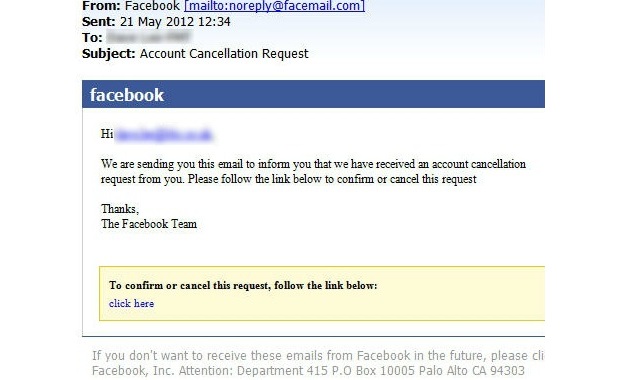Facebook account cancellation is malware, not Adobe Flash

Cyber criminals are pushing malware to those who are looking to get rid of their Facebook accounts. If you ever receive an e-mail asking to confirm or deny that you wish to cancel your account, delete it. The message in question may contain malware or may link to malware, such as Mal/SpyEye-B.
Facebook will never ask you to confirm or deny an account cancellation request. The company gives you the option to deactivate your account at facebook.com/deactivate.php, after which you can eventually delete it. There is no such thing as cancelling a Facebook account.
Above, you can see an example of such an e-mail, the body of which follows below, courtesy of Sophos:
Hi [e-mail address]
We are sending you this email to inform you that we have received an account cancellation request from you. Please follow the link below to confirm or cancel this request
Thanks, The Facebook Team
To confirm or cancel this request, follow the link below: click here
The "click here" link takes you to a third-party Facebook app, but that doesn't mean it's from Facebook. If you go to the app's page, you're prompted to install an unknown Java applet on your computer. If you say no, it keeps pestering you to allow it.
Cyber criminals know people value their Facebook accounts, and many would be upset to lose them. As such, they may blindly agree to whatever the app tells them to do, in order to "cancel" the account cancellation request.
If you do allow the applet to run, you will see a message telling you that Adobe Flash must be updated. This is of course nonsense. Instead of an Adobe Flash update, you'll get a backdoor Trojan installed, allowing remote hackers to spy on your activities and take control of your computer.
See also:
- Malware tricks Facebook users into exposing credit cards
- How to protect your Facebook account from stalkers
- Facebook virus or account hacked? Here's how to fix it.
- Facebook teaches users how to remove adware (video)
- Facebook admits it needs to fight scams more efficiently
- Facebook Immune System checks 25 billion actions every day
